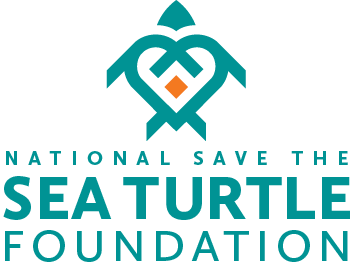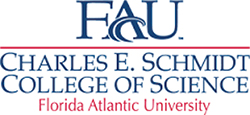
FAU Marine Science Laboratory Refreshed
Jeanette Wyneken, Ph.D.
Director, FAU Marine Science Laboratory
Director, FAU Marine Science Laboratory
Thirty years ago the walls were clean, the floors spotless, counters gleaming, and the promise of marine studies to come were still dreams. Twenty years ago a few small-scale studies of sea turtles, algae, sea grasses and cryptic marine fish were starting. The floors were no longer spotless, some counters were stained from a decade of chemicals, but the lab was about to get a more public face. The visitors’ gallery was cleaned, some modest signage was hung, and the labs activities were about to become more accessible. Initially, through some modest grants, then through the concerted efforts of the National Save the Sea Turtle Foundation and the Royal Caribbean Cruises Ltd., the lab’s walls, visitors’ gallery, and the now abundant turtle and ray tanks as well as their associated life support systems, have received some much needed TLC.
The FAU Marine Laboratory, one of the facilities within the Gumbo Limbo Environmental Complex, is owned and run by Florida Atlantic University’s Charles E. Schmidt College of Science. Like many University facilities, the Marine Lab depends upon donors to help support its infrastructure and programs directed toward student training. Thanks to the generosity of the National Save The Sea Turtle Foundation, this year we were able to repair the facility’s 30 year-old siding, give the interior walls a fresh coat of paint, repair the superstructure providing the electricity and freshwater to the turtle tanks,
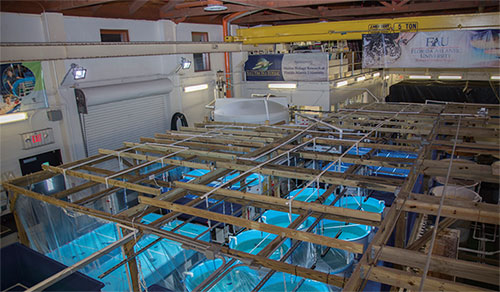
Figure 1. Overview of the FAU Marine Lab showing the improved and repaired superstructure over the tanks, tank lighting with full spectrum lights hung at the necessaryheight to supply the turtles with essential UV light, and the newly installed sea water tank is seen in the upper left.
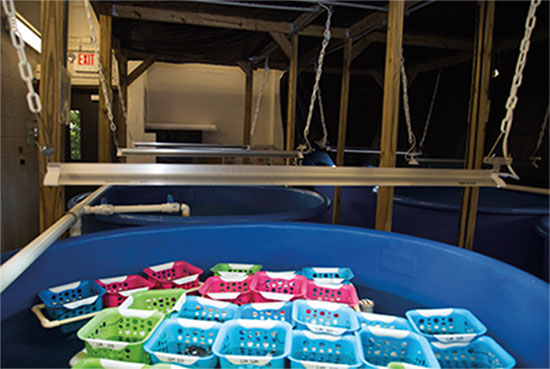
Figure 2. All sea turtles require ultraviolet light to metabolize calcium. The light fixtures over these green turtle hatchling tanks must be close enough to provide the turtles with the appropriate light levels, and the fixtures have to be rust-resistant in this saltwater environment.
hang new rust-resistant light fixtures over the tanks, and install a 3000 gallon sea water treatment tank which is essential for maintaining the leatherback turtles. The cost for these improvements was more than $37,000. Such generosity and investment in marine lab essential infrastructure makes possible the expansion and success of our sea turtle, shark, and marine algal research programs, thus enabling 5 internationally known faculty, as well as their associated undergraduate and graduate students, to pursue their research plans, and to communicate what they do and its importance to the general public.
To date, 65 leatherback turtles, more than 120 loggerheads, and 40 green turtles have come through the lab in summer 2020; our season is not yet over. Ongoing studies include continued work on annual variation in hatchling sea turtle sex ratios, experimental studies of the effects of rising beach temperatures on hatchling loggerhead learning, comparative studies of the success of newly formulated diets for leatherback neonates, lab testing of novel satellite tracking tags for neonate leatherbacks, and measures of the impact of accumulated Sargassum seaweed on the ability of hatchling loggerheads to locate the sea from the nest.
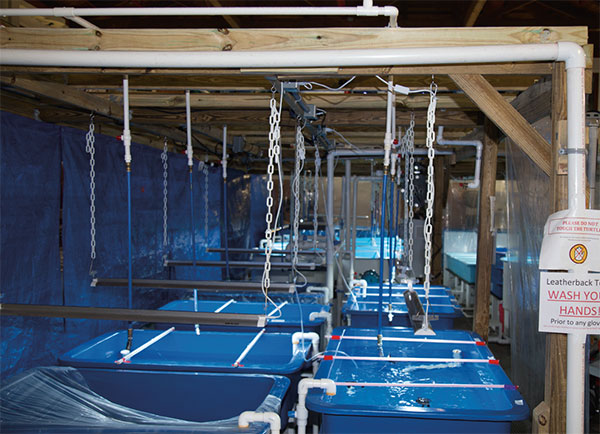
Figure 3. The repaired super structure over these leatherback tanks supports the full spectrum lights and freshwater showers (vertical blue hoses) that provide the turtles with drinking water. GFI electric outlets are also supported along the pressure treated wood structures.
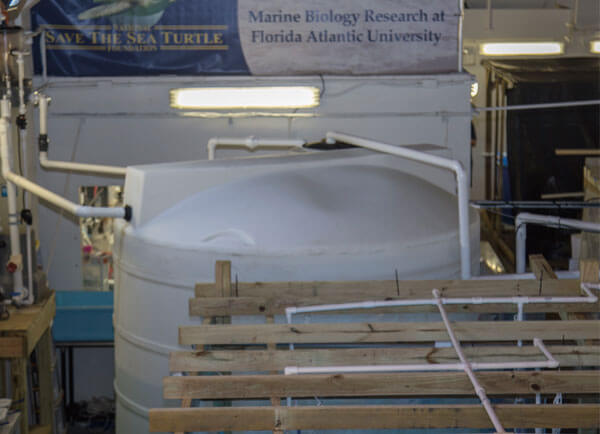
Figure 4. The newly installed 3000-gallon seawater tank allows us to prepare enough cleaned and sanitized seawater for the leatherbacks when they are in the lab. The FAU Marine Lab has the only successful leatherback husbandry program in the world. Improvements to the husbandry system , made possible by our generous donors, make it possible for our pioneering work in husbandry of this fragile species.
Helping Sea Turtles Survive for 39 Years
A NON-PROFIT ORGANIZATION
State of Florida Registration Number CH-2841 | Internal Revenue Code 501 (c) (3)
Web Design & Development by Web Expressions, LLC
